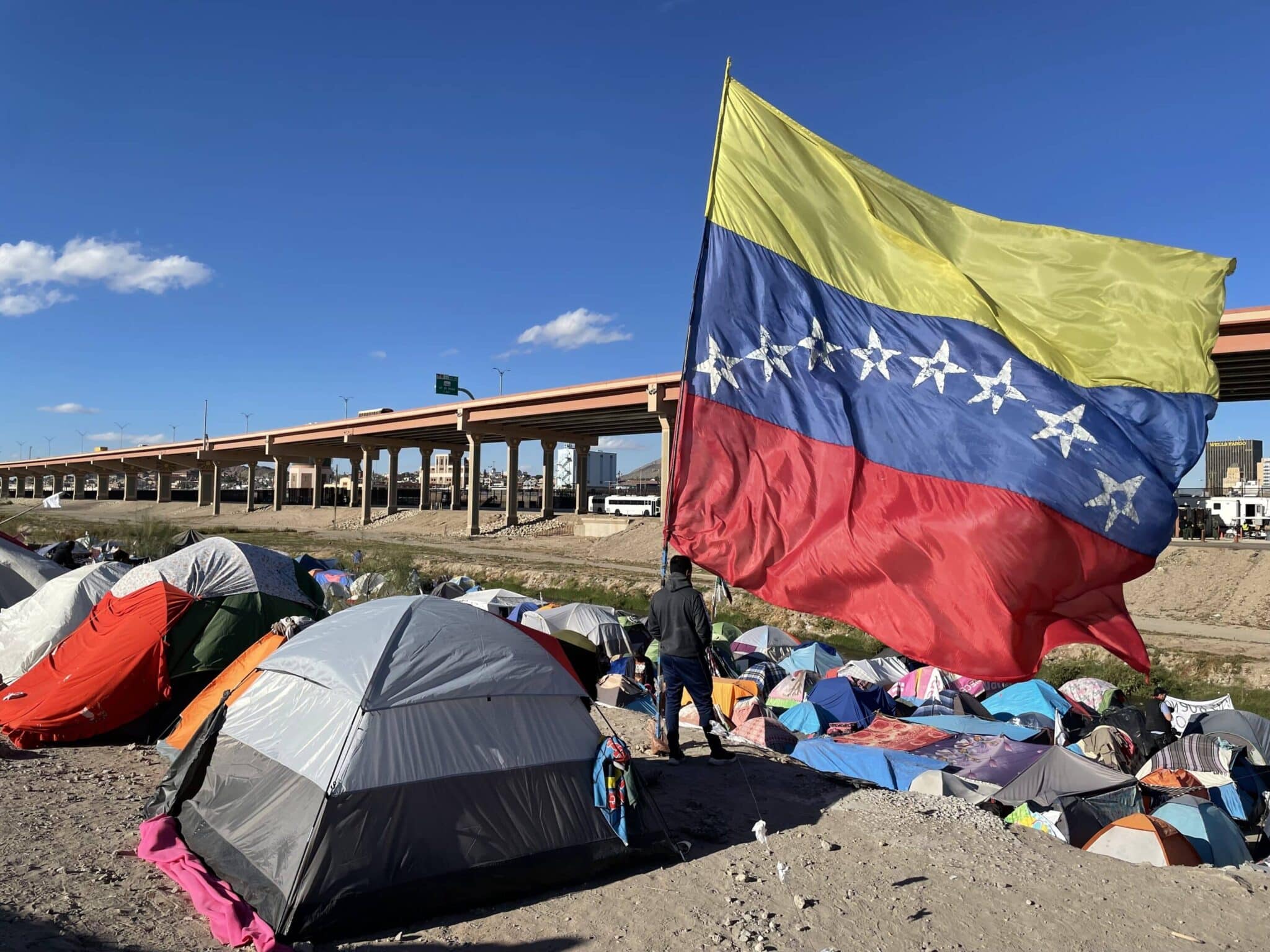
A migrant looks over the Rio Grande river into El Paso, Texas, from under a massive Venezuelan flag at a migrant encampment in Juárez, Mexico, on Thursday, Nov 10, 2022. Photo: Cody Copeland/Courthouse News.

Orinoco Tribune – News and opinion pieces about Venezuela and beyond
From Venezuela and made by Venezuelan Chavistas

A migrant looks over the Rio Grande river into El Paso, Texas, from under a massive Venezuelan flag at a migrant encampment in Juárez, Mexico, on Thursday, Nov 10, 2022. Photo: Cody Copeland/Courthouse News.
A report published this Monday, January 16, by 4Mi, a flagship primary data collection system of the Mixed Migration Center (MMC) heavily financed by Global North imperial governments, ivy league universities, and big corporations, analyzes the movement of Venezuelans across various borders in Latin America back to Venezuela.
Venezuelan migration has been one of the events most reported by the press and NGOs in recent years, even following the caravan of migrants step by step across South America to squeeze the most out of the drama of those who left. However, the return of Venezuelans to their country has gone unnoticed.
The MMC points out that there is almost no information on the motivations and future migratory intentions of the population willing to return to Venezuela; something that was in abundance, and even exaggerated, when these migrants moved in the opposite direction. The MMC briefing paper uses new data from 4Mi to explore the profiles of returning Venezuelans, the factors that drive them to leave their host countries, and their motivations for returning. It also offers an analysis of the expectations of refugees and migrants regarding their return to Venezuela and their future migratory intentions; albeit, all under the lens of an organization responding to the so-called rules-based order.
Highlights of the 4Mi report include:
The migration of Venezuelans, Cubans and Nicaraguans is heavily covered by mainstream media as part of regular anti-communist propaganda campaigns. The dramatic effect that the policies of Latin American countries (when they were controlled by the right-wing) and the countries of the self-styled West have had on these migratory waves encompasses most media coverage, while anti-imperialist nations encouraging and giving facilities to receive migrants is barely touched upon.
More and More Migrants Are Returning to Venezuela (+ Vuelta a la Patria)
According to many analysts, this strategy helps those Western countries in advancing their political agendas against anti-imperialist countries. It not only provides arguments to exploit the “humanitarian crisis” narrative used against this countries, but also drains the most qualified human resources from these countries for free—at least, at first—and, most recently, to feed the media trends with the narratives of the “unsuccessful” socialist projects in the region.
Other analysts also note that this strategy allows the so-called international humanitarian bodies to fundraise financial resources, allegedly to support these migrants, but many migrants complain about no assistance from them whatsoever.
Washington Blames Record Migration on ‘Communism’ When the Causes Are Closer to Home
The editor of the Orinoco Tribune, Jesus Rodriguez-Espinoza, was also asked about the matter. “In addition to the issue of international fundraising whose destination is not at all transparent, there is an industry that lives off these irregular migratory flows,” he stated. “There are coyotes, travel agencies that sell “packages” specially designed for migrants, there are airlines that profit from these migrations, there are buffets in the United States that make millions of dollars in this ‘niche market,’ and there are also communities of migrants from Venezuela, Cuba, or Nicaragua who need to keep the narrative of a ‘humanitarian crisis’ alive in order to solve not only their own migratory situation, but also the future migratory situation of relatives or friends that they would like to take to the host countries.”
The Venezuelan analyst also explained that much of the migratory flow detected in recent months, of Venezuelans to Europe and the United States, is comprised of Venezuelan migrants who were already residing in third Latin American countries, who had chosen not to return to Venezuela. “Explaining these political agendas does not necessarily mean ignoring the terrible economic situation that Venezuela has gone through since 2013-2015 and that still persists to some extent,” Rodriguez-Espinoza noted, “more specifically as a consequence of the blockade and illegal sanctions from the United States and Europe.”
(Misión Verdad) with Orinoco Tribune content
Translation: Orinoco Tribune
OT/JRE/AU